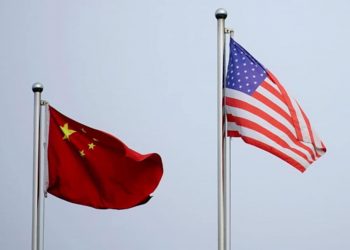AGENCE FRANCE-PRESSE,
New York: World oil prices rose Wednesday as world powers meeting in Paris decided to refer Iran back to the UN Security Council, raising the threat of sanctions over its nuclear program, traders said. Also supporting prices, US government data showed the country's energy stocks fell more sharply than expected last week.
New York's main contract, light sweet crude for delivery in August, closed up 79 cents at 74.95 dollars per barrel.
In London, Brent North Sea crude for August delivery settled up 72 cents at 74.39 dollars per barrel.
Renewed Middle East violence also contributed to oil market jitters, as eight Israeli soldiers were killed following an attack by Hezbollah militiamen on an army patrol along Israel's border with Lebanon.
“Obviously, the tension is rising in the Middle East. Things are getting out of control,” said Fadel Gheit, a market analyst at Oppenheimer.
“The world is getting much more violent, you see the bombing yesterday in India, you see escalation of violence in Iraq.
“(The) oil market usually reflects global tension. So global tension is rising, oil prices rise,” Gheit said.
In Paris, ministers from the Security Council permanent members plus Germany had met to hear a progress report from the EU's foreign policy chief Javier Solana, who had held talks in Brussels with Tehran's top nuclear negotiator Ali Larijani on Tuesday.
The world powers subsequently agreed to send Tehran back to the Security Council.
“The Iranians have given no indication at all that they are ready to engage seriously on the substance of our proposals,” French Foreign Minister Philippe Douste-Blazy said in a statement agreed with his colleagues from the United States, Britain, Germany, Russia and China.
“Iran has failed to take the steps needed to allow negotiations to begin … We express profound disappointment over this situation,” he said.
World powers are seeking a rapid response from Iran on a package of economic and political incentives aimed at persuading it to freeze uranium enrichment — a process needed to fuel a nuclear reactor but which could also be used to make a bomb.
Washington has warned Iran it would be exposing itself to UN Security Council action if it rejects the offer and the US Ambassador to the United Nations, John Bolton, said the Security Council could act “early next week” on a potential draft resolution.
Such a resolution would likely require a complete stop to Iran's uranium enrichment.
Analysts warn that Iran, a key OPEC member and the world's fourth-biggest oil producer, could disrupt its crude exports if hit by economic sanctions.
Although oil prices rose on the news, prices in New York did not pierce the 75.78 dollars all-time-high struck on Friday over geopolitical concerns linked to Iran, but also North Korea.
Meanwhile, the US Department of Energy said crude and gasoline stockpiles both fell last week.
The falls come amid the crucial holiday driving season, and while demand for gasoline, or petrol, is at record highs.
The weekly DoE inventories report showed crude oil reserves fell by six million barrels to 335.3 million over the week ended July 7, compared with a forecasted drop of just 1.3 million barrels.
Gasoline reserves showed a larger-than-forecast fall of 400,000 barrels to 212.7 million, against expectations they would drop by as much as 300,000 barrels.
“The crude figures are the most obviously bullish part of this report,” Societe Generale analyst Deborah White said, meaning that this data supported prices more than the gasoline numbers.








